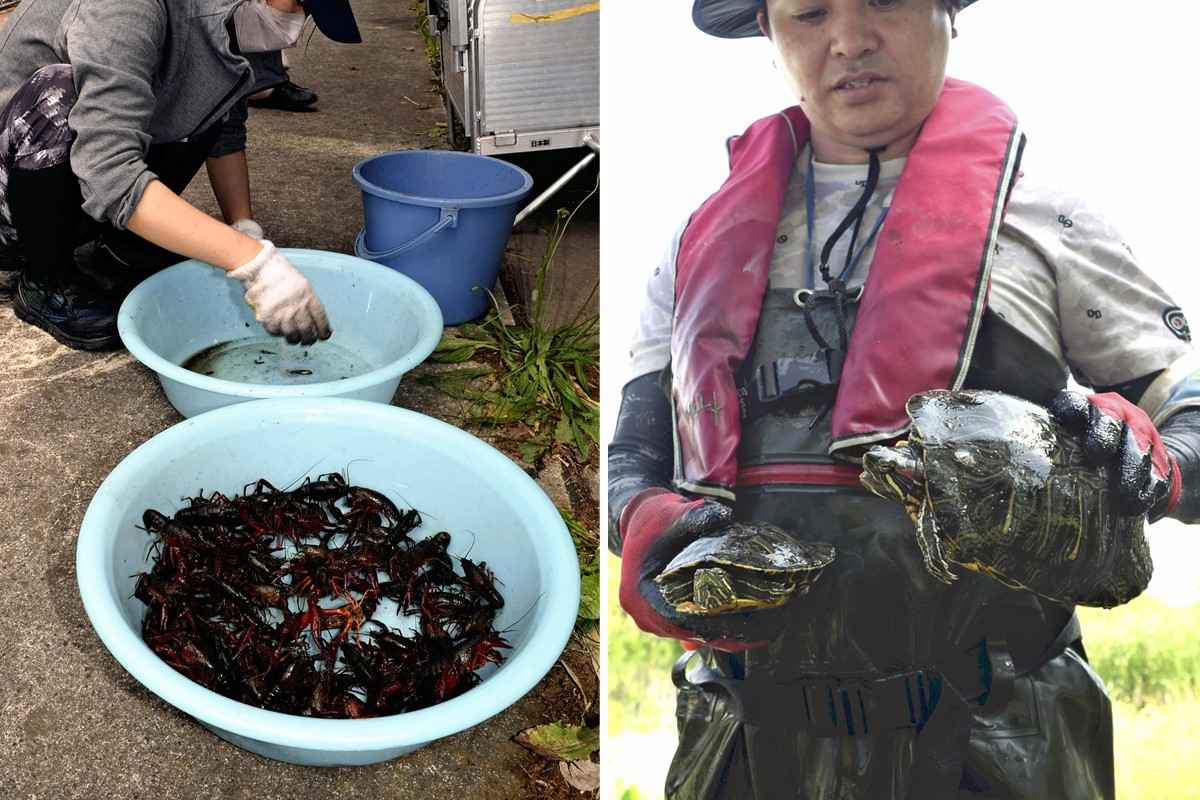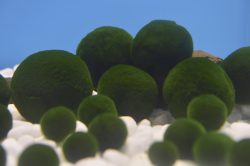
Left: Red swamp crayfish caught in traps set in a waterway in Mizumoto Park in Katsushika Ward, Tokyo
Right: A red-eared slider caught in a trap set in Mizumoto Park in Katsushika Ward, Tokyo
14:10 JST, June 5, 2023
A government ordinance targeting two invasive alien species came into force Thursday, banning the trade of red swamp crayfish and red-eared slider turtles and their release into the wild. Violators of the rule may face penalties.
As the two creatures are popular as pets, the government implemented a decree designating them as “conditioned invasive alien species” under the revised Invasive Alien Species Law.
The law prohibits the raising, releasing into the wild, selling and importing of invasive alien species. But creatures designated as “conditioned invasive alien species” are exempted from certain restrictions. The range of exemptions for individual creatures will be determined under the ordinance.
Violators face up to three years in prison or a fine of up to ¥3 million.
Red swamp crayfish entered Japan as food for American bullfrogs, which had themselves been imported for use as food before World War II. Red-eared sliders started being imported from the 1950s as pets. Both species are known to be highly fertile and cause serious damage to the ecosystem, feeding on fish and aquatic plants.
In late May, members of a non-profit organization, Mizumoto Nature Project, were seen setting traps in a waterway in Mizumoto Park in Katsushika Ward, Tokyo. More than 70 red swamp crayfish were caught within less than two hours.
“We should patiently continue efforts to exterminate the creatures,” an official of the group said.
Under the new regulation, individuals may bring home red swamp crayfish they have caught in a pond or elsewhere. But if they find it difficult to keep the creatures and release them back into the wild, the act constitutes a violation of the ordinance.
Sales of the two species are also banned at pet shops. Purchasing through other means will also be in violation of the law.
The Environment Ministry estimates that 5.4 million red swamp crayfish and 1.6 million red-eared sliders are being kept as pets in homes across the country.
A designation of the creatures as an invasive alien species prohibits individuals not only from trading and releasing them into the wild, but also from keeping them as pets. But with the enactment of the ordinance, individuals may continue to keep the two “conditioned invasive alien species.”
“We want to urge people not to bring them back home without careful consideration,” said an official of the Environment Ministry. “If they decide to keep them, we want people to take responsibility for them as long as the creatures are alive.”
Top Articles in Science & Nature
-

Japan Institute to Use Domestic Commercial Optical Lattice Clock to Set Japan Standard Time
-

Japan to Face Shortfall of 3.39 Million Workers in AI, Robotics in 2040; Clerical Workers Seen to Be in Surplus
-

Record 700 Startups to Gather at SusHi Tech Tokyo in April; Event Will Center on Themes Like Artificial Intelligence and Robotics
-

iPS Treatments Pass Key Milestone, but Broader Applications Far from Guaranteed
-

iPS Cell Products for Parkinson’s, Heart Disease OK’d for Commercialization by Japan Health Ministry Panel
JN ACCESS RANKING
-

Japan PM Takaichi’s Cabinet Resigns en Masse
-

Japan Institute to Use Domestic Commercial Optical Lattice Clock to Set Japan Standard Time
-

Israeli Ambassador to Japan Speaks about Japan’s Role in the Reconstruction of Gaza
-

Man Infected with Measles Reportedly Dined at Restaurant in Tokyo Station
-

Videos Plagiarized, Reposted with False Subtitles Claiming ‘Ryukyu Belongs to China’; Anti-China False Information Also Posted in Japan
























